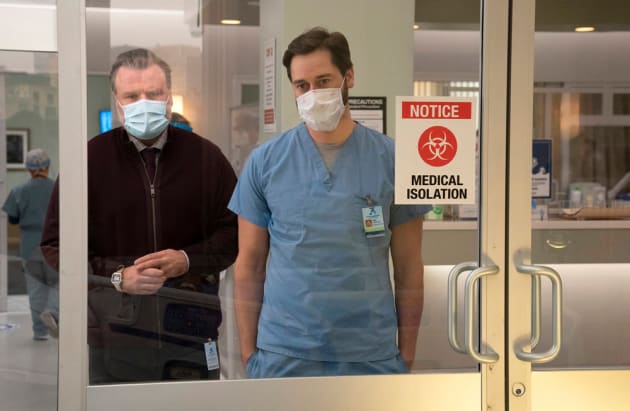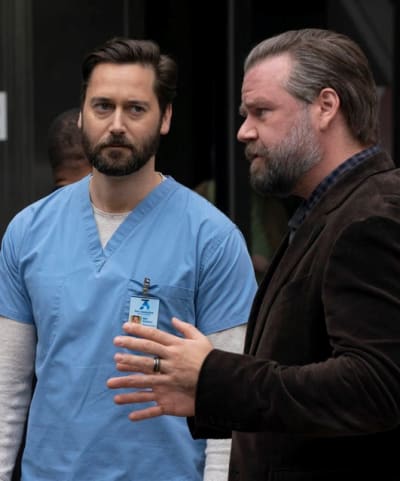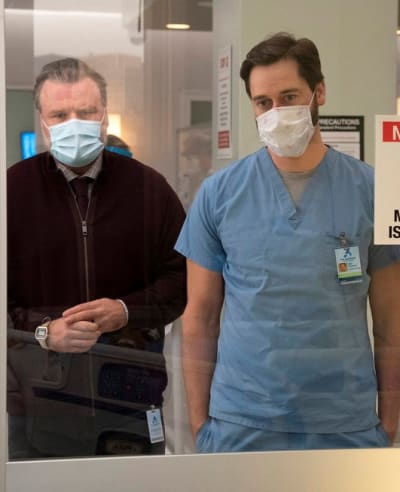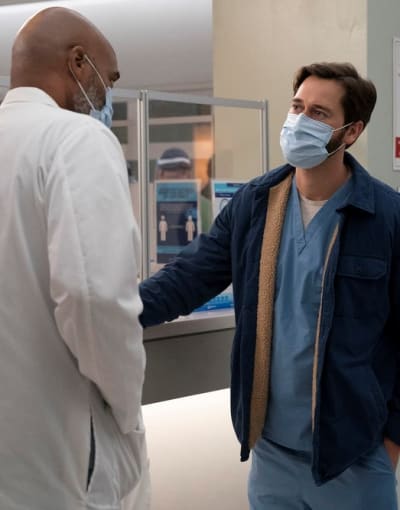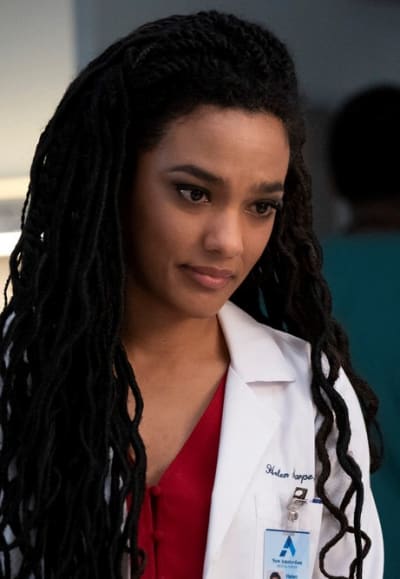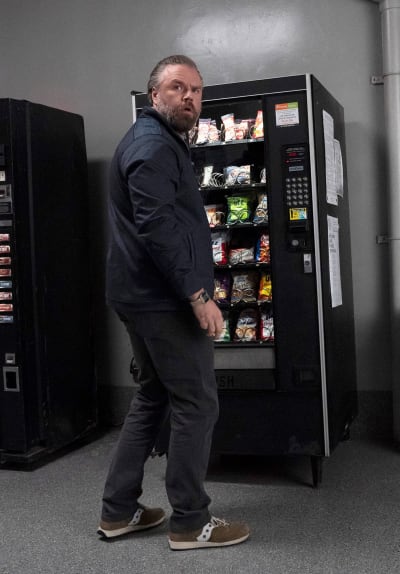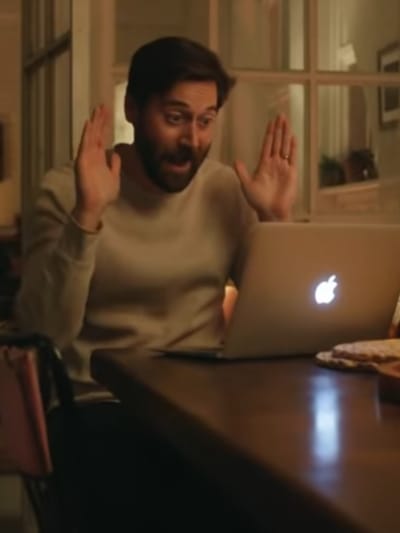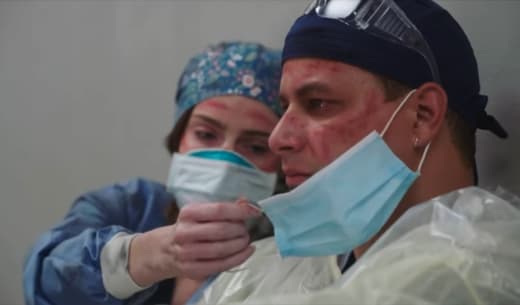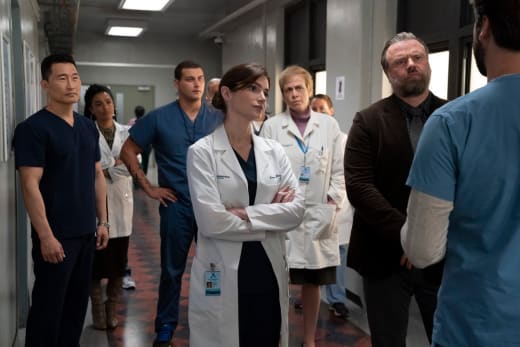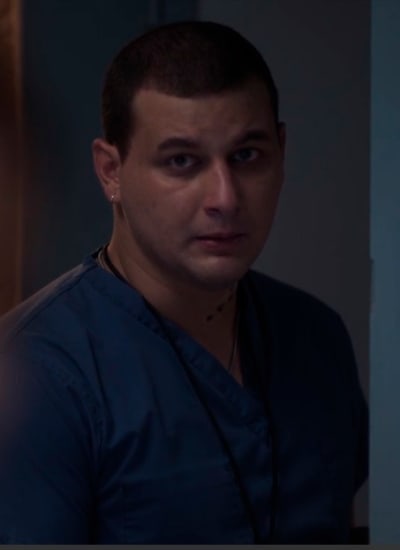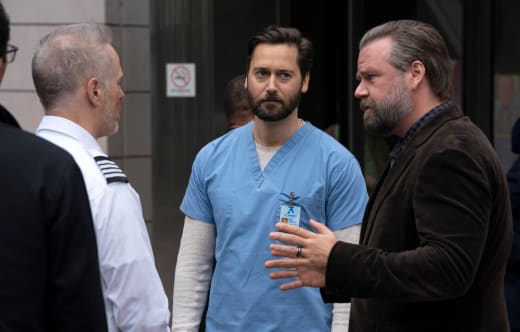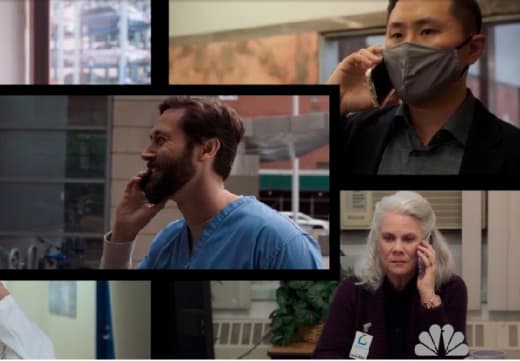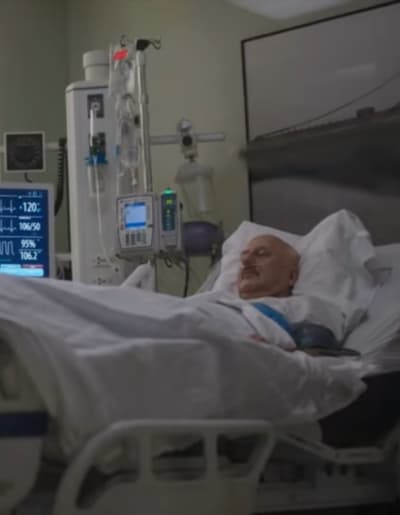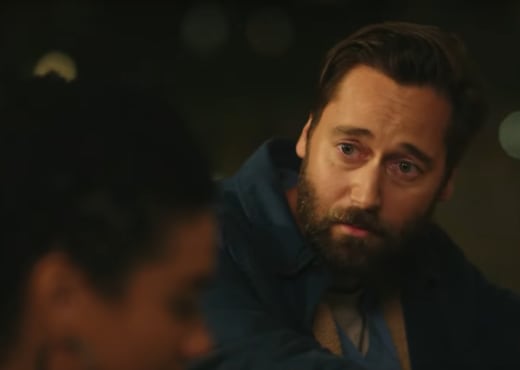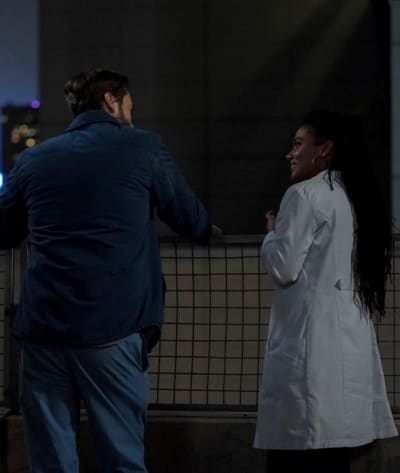New Amsterdam’s return feels like the warm embrace of a loved one that we still can’t experience, and the poignancy of that isn’t lost.
The first five minutes of New Amsterdam Season 3 Episode 1, served as a meaningful tribute to all frontline workers who poured their entire selves into saving lives during the peak of the pandemic, and they were the most heartrending, exquisite moments of a stellar hour.
The series has never felt more resonant, as the characters, like the rest of us, are trying to figure out what this new normal is and where we go from here.
Many series are tackling the pandemic in several ways. Medical dramas, specifically, are touching upon and building stories around it to honor the real-life heroes they write about and portray and make sense of some of the things we discovered about the healthcare system amid the pandemic.
What separates New Amsterdam from the others is how the series has found success in a timeline that aligns with our own. Via montage form, we saw what the characters have gone through during the pandemic’s peak, especially in a COVID ravaged NYC.
But we’re revisiting the series now, they’ve rolled out the vaccines, and we’re in this weird limbo space of not quite being post-pandemic but also not being in the thick of it. The masks are there, and then they aren’t, depending on the scene, but it feels more authentic.
The season’s tagline spouts that it’s “time to heal,” and we get that sense. It’s like those bleary-eyed moments of hazy confusion when the fog settles, the stench of napalm still lingers, and the body is still tense with uncertainty, wondering if and when something else is happening next.
It’s visceral, a deliberate cognizant choice, but it’s still distinctly New Amsterdam. In that sense, so far, it’s the strongest of the medical dramas keeping us grounded in reality, capturing the authenticity of this moment, and still being that familiar show we know and love that doesn’t overwhelm the viewers too much.
I want everyone to know that I am committed to fixing the cracks around here, OK? The system abandoned us when we need it most, and I vow to fix the system that left us overburdened and unprotected. The system that left our most vulnerable patients behind, and hopefully, New Amsterdam can finally get back to —
Max
But who knows? It’s still early.
Each of our heroes bears scars from what they’ve endured over the past year. And the series has done well showing that and how it affects them daily now.
All of it ranges from compelling to relatable in some aspect or another. The pandemic halted so many good things, like romance and love, and we saw that with Helen as we learned she’s been dodging Cassian’s calls for months.
It’s not to say she doesn’t like him or wants to pursue something, but she doesn’t know how to right now. She was in the thick of it with her colleagues, treating patients, saving lives, and watching people die. She’s spent the year experiencing that form of alienation and isolation, and it left a lasting effect.
You’re incredibly upbeat for someone who’s living on seeds.
Lauren [to Iggy]
She obsessively washes and cleans herself, developing some form of OCD, a learned behavior after a year of practicing such behavior with frequency in hopes of minimizing contracting the virus.
It’s understandable, but her inability to touch or be touched is heartbreaking when you take the time to process it.
Her body physically recoiled at Cassian’s touch before she could even think about, it which prompted her to apologize profusely. How do you react like that to a man you’ve shown interest in, right?
But we’ve conditioned ourselves to keep six feet apart or limit contact, and the body doesn’t unlearn a yearlong habit overnight. Personally, it was one of the most relatable displays of the hour.
Lauren: How does no one know what happened to our patients?
Casey: Because once you pass him on, they’re no longer our patients.
Lauren: Wrong! This is an emergency room, not a waiting room. I want a full report of everyone who came here today, by end of shift.
Helen doesn’t know what to make of this new world; all the things she took for granted feel wrong.
The only indicator of Iggy’s eating disorder during this installment was his current obsession with healthier food and all the recipes and cooking habits he picked up during quarantine. Oh, there’s probably a story there, and it couldn’t be a better time to delve into Iggy’s issues with full-force.
Many people have struggled with weight issues, fluctuating eating habits, and other matters about health and fitness over the past year. An already relatable plot for many will likely be even more so now.
It speaks to how New Amsterdam is the perfect series to implement the pandemic and the human elements, the effects, psychologically, mentally, emotionally, and within the healthcare system with effortless ease.
Nurse: We just paged Cardio. She’s not your patient anymore.
Lauren: They’re all my patients.
They’re in their wheelhouse here, and the pandemic with all the scars it left and the cracks it revealed aligns nicely with this series and what it has always been.
Max still has his optimistic, can-do attitude, which is more refreshing and appreciated than ever before, but it comes with a slight jadedness. You can see the wear and tear, and that feels real.
He’s determined to build a better system than the one that demonstrably failed them when they needed it most. He’s determined to save Kapoor, clinging to a beloved friend and colleague because they can’t lose anyone else. You felt the desperation in that.
Max’s despair is also rooted in the fact that the pandemic, and how ill-equipped we were to deal with it, has robbed him of the chance to see his sweet girl.
If Luna has been away from him since the beginning, he hasn’t seen her beyond Face Times with crappy connections in roughly a year. Of course, this man wants to build a better system!
However, Lauren’s pandemic plight touched on a unique take that you wouldn’t have anticipated, and yet, is quintessentially Lauren Bloom.
Lauren peaked during the worst of the pandemic. It was a time where she felt the most useful in her life. It’s the moment she was created for, in her mind, and it was hard to come back down and transition back to “normal.”
During the pandemic, all hands were on deck, and there was no real distinction between scrubs, coats, and titles. They all worked as one, and if you could do something, you did it, regardless of specialties or level of expertise.
Lauren: When we were knee-deep in the pandemic, you were thanking me for taking over your patients.
Cardo surgeon: Well, thank God we aren’t there anymore.
The come-down from that is giving Lauren a rough time. In a superb scene between Lauren and Casey, the two dug into why that is.
Lauren kept overstepping, driving the ED to keep updated on the dozens upon dozens of patients that crossed through those doors, even after they handed them off to others.
She nearly made things much worse when she took the initiative of cutting into a patient instead of waiting for cardio to arrive, and Lauren didn’t take kindly to the reminder that she was out of her depth.
Lauren is living for the fight, and she hated how insensitive and “sociopathic” it sounded to confess that she missed the worst of the pandemic. It gave her a sense of purpose, and she lost without that.
Casey: What’s going on with you today?
Lauren: I miss it.
Casey: Miss what?
Lauren: I miss the pandemic. I mean the worst of it. You know I feel like a sociopath even saying this, but when we were hit the hardest when the ED was above capacity, I felt like I spent my whole life training for a moment that finally came. I helped people. I saved them. And even when I couldn’t save them, I was doing exactly what I was meant to do. My patients’ hands as they died, I sang songs to them, and now, what? I’m supposed to pass them off as if they don’t matter to me? They matter.
Casey: I never told anyone this, but when my deployment ended, I missed it, you know? I missed knowing what I had to do and doing it. I missed the fight. You were at war, Lauren. It’s OK to miss the fight. Oh, and uh, by the way? You haven’t stopped saving people. The doctors, nurses, me. You saved us, too. You’re still saving us.
She grew invested in each of her patients, immersed herself in all aspects of their lives and care, and it’s hard for her to give that up and go back to something resembling normal.
She couldn’t have confided in a better person than Casey, who is always blunt with her, but he’s also a war veteran. And we’ve seen the analogy; we use the language and make the comparisons.
It’s war.
They all went to war against a virus; with any form of battle, it takes a toll on a person.
It’s the quiet exploration of this collective trauma and grief that we have yet found the language to describe that makes scenes like that one so evocative.
And was there a hint of something else beneath the surface? Casey’s specifying that Lauren saved him felt more intimate than it lets on.
Iggy did expertly touch upon trauma with his patient, Starks. Despite the pandemic address, the series presented us with emotional cases as it always does.
The near plane crash was intense, as was the hospital gearing up for incoming triage, but the subsequent hunt by the NTSP looking to hinge the faulty plane on Starks along with Iggy and Max’s refusal to hand him over was New Amsterdam games.
Starks had it rough, and Iggy’s little rant about how heavily stigmatized mental illness is and why people suffer because of a society that compels them to hide it was gospel truth.
Max: I need you to listen.
Iggy: It never fails to amaze me how stigmatized mental health is in this country. It’s unbelievable. At New Amsterdam, we have dozens of doctors with a variety of mental health care issues and because this hospital’s policy is one of understanding and respect, they manage their condition without it ever affecting their work. It seems simple, but everywhere else in the world it’s some flaw, it’s a deficiency, it’s a detriment, it’s their fault somehow. No wonder people are hiding it from their employers! Which compounds their shame, increases the public distrust, and contributes to inadequate medical intervention. It’s so simple! I’m tired of it, Max. I want to bring mental healthcare out into the open. No more shame. No more hiding. I’m sorry, what do you need?
Max: We need to … hide your patient.
Starks was an exceptional pilot, and he kept up with his routine and took care of himself, but it didn’t keep him from fearing the worst — that he had a manic episode somehow, and maybe he nosedived the plane in some attempt to kill himself.
It’s a wonder his first moments with Iggy he was catatonic. But Iggy was able to talk him through everything, and he had an unwavering faith in Starks and his abilities.
The revelation that the words uttered by his co-pilot were to inform everyone that Starks was a hero who saved them was such a relief. They came in the nick of time, too.
No other hospital would be willing to give Starks the benefit of the doubt or take the time to figure out what was happening to spare him from criminal charges. Max and the others always prioritize their patients above all else and go above and beyond.
My 15-year-old son has access to more drugs than I do.
Bill
We saw it again when it came to Max’s dogged attempt to obtain propofol at the hospital so Kapoor and others could get off of the ventilator.
It’s sickening to see the gross shortages that all the hospitals are facing. Each hospital is allotted the same amount of supplies instead of receiving what they most demand.
Max’s inadvertent creation of a sort of medical tree where each of them barters with their supplies, so everyone gets what they need, was pure brilliance.
Ideally, if hospitals aren’t doing that already, then they should be to the benefit of all of their patients. I loved the reminder of how well-intended and pure-hearted Maxi is.
He kept going along, connecting everyone with the person they needed even when it didn’t appear to be to his benefit.
And Kapoor is off of the ventilator, but he’s not out of the woods yet. They were all so thrilled to see him awake, but his doctor shared some troubling news.
The COVID severely damaged Kapoor’s heart, and he needs the best cardio-surgeon. Enter Floyd. Didn’t it make you smile a bit when Floyd answered Max’s call and recited Max’s signature inquiry?
Max is relentless in trying to make everything better and help others, and his quiet moment on the rooftop says it all.
How can I help?
Floyd [answering Max’s phone call]
Max wants to make a better world for his daughter, Helen, and everyone. If the pandemic hasn’t done anything, it’s exposed how deeply cracked this healthcare system is.
It’s something that Max has known and discussed for as long as he can remember, but it’s far worse than he could’ve ever imagined.
He’s concluded that this isn’t a system that he can fix. Ideally, it’s something that needs to be dismantled and rebuilt into something stronger and better.
Of course, after a long day, he and Helen escaped to the rooftop for a moment of peace, reflection, and vulnerability. It’s hard not to cherish those moments between them and the bond that they have.
Helen: How’s our Ms. Luna?
Max: I wouldn’t know, she’s still frolicking in suburban splendor with Georgia’s parents.
Helen: How often do you get to see her?
Max: Not enough. I miss her. I miss her like crazy.
Helen: I know.
Max: It’s just not safe enough to bring her home.
Helen: Nothing’s safe anymore though,is it? Everything that was normal, friends, restaurants, intimacy, they all seem so strange, you know? They feel wrong. I used to be scared of the virus, but now I am scared of normal.
Max: Normal. I kept thinking, once everything gets back to normal, I can finally fix this hospital. That I could fix it, but I don’t want to fix this hospital anymore if we could go back to normal. I don’t want to fix the system. I want to tear it down.I want to tear it all down and build something better. Something better or my daughter, something better for you, something better for all of us. I mean otherwise what the hell was this all for?
We get some of the best, most authentic, and rawest moments from both characters when they share time like this. They strip away everything else, and it’s just them, trying to make sense of this world that they’re in and how they feel about it all.
Their moments of intimacy are always a highlight of the series. One of the beautiful things about Max’s admission, aside from the fact that he considers Helen as one of the reasons he wants and needs a better system and world, is that he trusts that she’ll be right by his side to help him dismantle it himself.
Over to you, ‘Dam Fanatics. What are your thoughts on this premiere? Did the COVID coverage move you beyond words? What do you think of Max’s new goal? What was your favorite moment of the hour?
Hit the Show Comments tab below, and let’s discuss everything.
Don’t forget to check out our exclusive interview with executive producers David Schulner and Peter Horton.
You can watch New Amsterdam online here via TV Fanatic.
Jasmine Blu is a senior staff writer for TV Fanatic. Follow her on Twitter.
